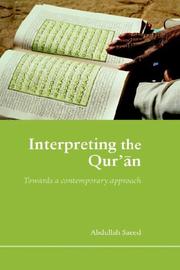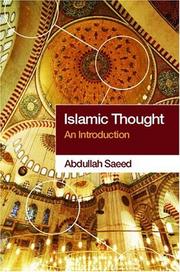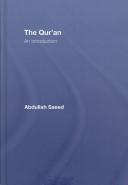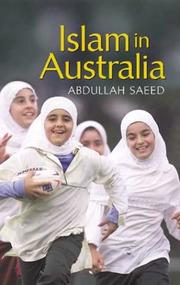| Listing 1 - 10 of 20 | << page >> |
Sort by
|

ISBN: 0415365384 0415365376 9780415365383 9780415365376 9780203016770 9781134215874 9781134215911 9781134215928 Year: 2006 Publisher: New York: Routledge,
Abstract | Keywords | Export | Availability | Bookmark
 Loading...
Loading...Choose an application
- Reference Manager
- EndNote
- RefWorks (Direct export to RefWorks)
Saeed explores the current debates surrounding the interpretation of the Qur'an, and their impact on contemporary understanding of this sacred text. As he attempts to determine the text's relevance to modern issues without compromising the overall framework of the Qur'an, and its core beliefs and practices, he proposes a fresh approach, which takes into account the historical and contemporary contexts of interpretation. The book's modernist approach is likely to inspire healthy debate and appeal to a generation of students and scholars seeking a contemporary approach to the interpretation of the Qur'anic text.
Koran --- Qur'an --- Hermeneutics --- Criticism, interpretation, etc. --- 297.181 --- Islam: canonieke boeken; Koran --- Hermeneutics. --- 297.181 Islam: canonieke boeken; Koran --- Qurʼan --- Al-Coran --- Al-Qur'an --- Alcorà --- Alcoran --- Alcorano --- Alcoranus --- Alcorão --- Alkoran --- Coran --- Curān --- Gulan jing --- Karan --- Koranen --- Korani --- Koranio --- Korano --- Ku-lan ching --- Ḳurʼān --- Kurāna --- Kurani --- Kuru'an --- Qorān --- Quräan --- Qurʼān al-karīm --- Qurʺon --- Xuraan --- Κοράνιο --- Каран --- Коран --- קוראן --- قرآن --- Criticism, interpretation, etc

ISBN: 0415364094 9780415364096 020301524X 0415364086 9780415364089 9780203015247 9781134225606 9781134225644 9781134225651 Year: 2006 Publisher: London: Routledge,
Abstract | Keywords | Export | Availability | Bookmark
 Loading...
Loading...Choose an application
- Reference Manager
- EndNote
- RefWorks (Direct export to RefWorks)
Islamic Thought is a fresh and contemporary introduction to the philosophies and doctrines of Islam. Abdullah Saeed, a distinguished Muslim scholar, traces the development of religious knowledge in Islam, from the pre-modern to the modern period. The book focuses on Muslim thought, as well as the development, production and transmission of religious knowledge, and the trends, schools and movements that have contributed to the production of this knowledge. Key topics in Islamic culture are explored, including the development of the Islamic intellectual tradition, the two foundation texts, the Qur'an and Hadith, legal thought, theological thought, mystical thought, Islamic Art, philosophical thought, political thought, and renewal, reform and rethinking today. Through this rich and varied discussion, Saeed presents a fascinating depiction of how Islam was lived in the past and how its adherents practise it in the present. Islamic Thought is essential reading for students beginning the study of Islam but will also interest anyone seeking to learn more about one of the world's great religions.
Islam --- Essence, genius, nature. --- -Islam --- -297.11 --- 297.12 --- Islam: godsdienstfilosofie --- Islam: theologie; doctrine --- 297.12 Islam: theologie; doctrine --- 297.11 Islam: godsdienstfilosofie --- 297.11 --- Essence, genius, nature --- Islam - 21st century. --- Islam - Essence, genius, nature.

ISBN: 041542125X 9780415421256 9780415421249 0415421241 9780203938454 9781134102891 9781134102938 9781134102945 Year: 2008 Publisher: London: Routledge,
Abstract | Keywords | Export | Availability | Bookmark
 Loading...
Loading...Choose an application
- Reference Manager
- EndNote
- RefWorks (Direct export to RefWorks)
This book provides a student-friendly guide to the many ways in which the Qur'an can be read. Designed for both Muslims and Western non-Muslim students it examines the Qur'an in Western scholarship as well as giving an overview of the rich interpretive traditions from the time of the Prophet Muhammad to the present day. This guide is a concise introduction to all aspects of the Qur'an : history, understanding and interpretation providing : coverage of both pre-modern and modern periods ; plenty of examples to illustrate key points and aid student understanding ; summaries, timelines and a glossary
Book
ISBN: 9780415498685 9780415549387 9780415549370 9780415549363 9780415549356 0415549353 0415549361 0415549388 041554937X 0415498686 Year: 2010 Volume: *23 Publisher: Milton Park: Routledge,
Abstract | Keywords | Export | Availability | Bookmark
 Loading...
Loading...Choose an application
- Reference Manager
- EndNote
- RefWorks (Direct export to RefWorks)
Islam and politics --- Islam and state --- Islamic countries --- Politics and government --- Islamic countries - Politics and government
Book
ISBN: 9781784716578 178471657X Year: 2018 Publisher: London: Elgar,
Abstract | Keywords | Export | Availability | Bookmark
 Loading...
Loading...Choose an application
- Reference Manager
- EndNote
- RefWorks (Direct export to RefWorks)
Is there a basis for human rights in Islam? Beginning with an exploration of what rights are and how the human rights discourse developed, Abdullah Saeed explores the resources that exist within Islamic tradition. He looks at those that are compatible with international human rights law and can be garnered to promote and protect human rights in Muslim-majority states. A number of rights are given specific focus, including the rights of women and children, freedom of expression and religion, as well as jihad and the laws of war. Human Rights and Islam emphasises the need for Muslims to rethink problematic areas of Islamic thought that are difficult to reconcile with contemporary conceptions of human rights
Human Rights. --- Human rights --- Civil rights (Islamic law) --- Droits de l'homme. --- Droits de l'homme --- Droits de l'homme (droit islamique) --- Religious aspects --- Islam. --- Aspect religieux --- Islam --- Human rights - Religious aspects - Islam. --- Droits de l'homme - Aspect religieux - Islam
Book
ISBN: 1849801320 1784713961 9781849801324 Year: 2012 Publisher: Cheltenham : Elgar:
Abstract | Keywords | Export | Availability | Bookmark
 Loading...
Loading...Choose an application
- Reference Manager
- EndNote
- RefWorks (Direct export to RefWorks)
In this topical collection, Professor Abdullah Saeed brings together seminal articles encompassing key issues in the debates surrounding Islam and human rights. Topics covered in this comprehensive two-volume set include approaches to international human rights, freedom of expression, the right to equality under Islamic law and Islamic human rights schemes. The editor has also included a number of case studies which, along with an original introduction, greatly enhance the depth of the collection. This authoritative and timely book will be of great interest to both academics and practitioners and will serve as an excellent reference tool for anyone with an interest in Islam and human rights. In this topical collection, Abdullah Saeed brings together seminal articles encompassing key issues in the debates surrounding Islam and human rights
Book
ISBN: 9780415677509 9780415677493 0415677505 0415677491 131797414X 1315870924 1317974158 1306185866 Year: 2014 Publisher: New York, N.Y. : Routledge,
Abstract | Keywords | Export | Availability | Bookmark
 Loading...
Loading...Choose an application
- Reference Manager
- EndNote
- RefWorks (Direct export to RefWorks)
"Reading the Qur'an in the Twenty-First Century considers the development of Qur'anic interpretation and highlights modern debates around new approaches to interpretation. It explores how Muslims from various theological, legal, socio-political and philosophical backgrounds think about the meaning and relevance of the Qur'an, and how their ideas apply in the contemporary world. The book: - reflects on one of the most dominant approaches to interpretation in the pre-modern period, textualism, and the reaction to that in Muslim feminist readings of the Qur'an today. - covers issues such as identifying the hierarchical nature of Qur'anic values, the criteria for the use of hadith in interpretation, fluidity of meaning and ways of ensuring a degree of stability in interpretation. - examines key Qur'anic passages and compares pre-modern and modern interpretations to show the evolving nature of interpretation. Examples discussed include: the authority of men over women, the death of Jesus, shura and democracy, and riba and interest. Abdullah Saeed provides a practical guide for interpretation and presents the principal ideas of a contextualist approach, which situates the original message of the Qur'an in its wider social, political, cultural, economic and intellectual context. He advocates a more flexible method of interpretation that gives due recognition to earlier interpretations of the Qur'an while also being aware of changing conditions and the need to approach the Qur'an afresh today"--
Qur'an as literature --- Qur'an as literature. --- Qurʼan --- Reading. --- Criticism, interpretation, etc. --- Qurʼan as literature.

ISBN: 1741150876 1865088641 Year: 2003 Publisher: Sydney Allen & Unwin
Abstract | Keywords | Export | Availability | Bookmark
 Loading...
Loading...Choose an application
- Reference Manager
- EndNote
- RefWorks (Direct export to RefWorks)

ISBN: 1134215916 1134215924 1280268182 9786610268184 0203016777 0415365376 0415365384 Year: 2006 Publisher: London ; New York : Routledge,
Abstract | Keywords | Export | Availability | Bookmark
 Loading...
Loading...Choose an application
- Reference Manager
- EndNote
- RefWorks (Direct export to RefWorks)
How is the Qur'an - central to all Muslim societies - to be understood today in order to meet the needs of these societies? Abdullah Saeed, a distinguished Muslim scholar, explores the interpretation of the ethico-legal content of the Qur'an, whilst taking into consideration the changing nature of the modern world. Saeed explores the current debates surrounding the interpretation of the Qur'an, and their impact on contemporary understanding of this sacred text. Discussing the text's relevance to modern issues without compromising the overall framework of the Qur'an and its core belie
Koran --- Hermeneutics. --- Criticism, interpretation, etc. --- Qurʼan
Book
ISBN: 1317974131 Year: 2014 Publisher: Taylor & Francis
Abstract | Keywords | Export | Availability | Bookmark
 Loading...
Loading...Choose an application
- Reference Manager
- EndNote
- RefWorks (Direct export to RefWorks)
| Listing 1 - 10 of 20 | << page >> |
Sort by
|

 Search
Search Feedback
Feedback About UniCat
About UniCat  Help
Help News
News